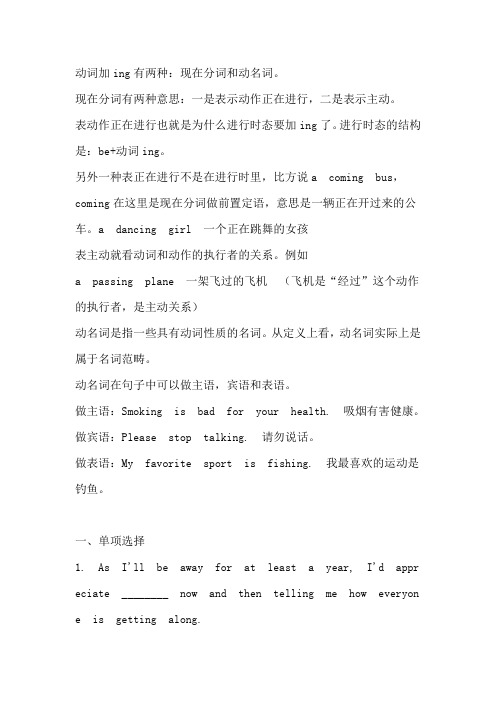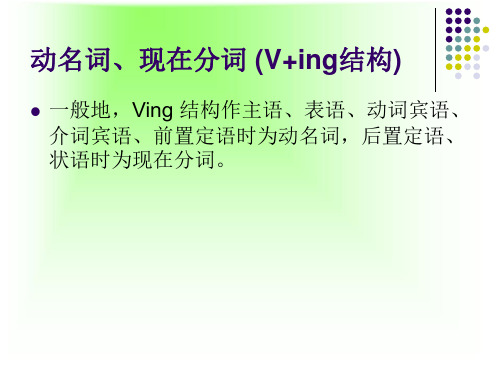现在分词与动名词时态
动名词与现在分词

动名词
① 动名词的一般式 一般式所表示的动作和谓语动词的动作同时发生,表示经常性、习惯性的
动作(或状态),也可能在谓语动词表示的动作之后发生。 I enjoy skiing in nature. 我享受在大自然中滑雪。(enjoy与skiing同时发生) He insisted on going with us. 他坚持跟我们一起去。(going发生在insisted on之后) ② 动名词的完成式 动名词的完成式表示的动作发生在谓语动词表示的动作之前。 I remembered having met him before. 我记得之前见过他。 She denied having skipped class. 她否认逃课。
④ 动名词的否定式 动名词的否定式由“not+动名词”构成。 You will regret not following my advice. 你会后悔没听我的劝告。 I am sorry for not calling you back. 很抱歉没有回电话给你。
⑤ 动名词的复合结构 动名词复合结构由“物主代词或名词所有格+动名词”构成。 在动名词复合结构中,物主代词或名词所有格是动名词的逻辑主语。这种复合结构多用作
分词running和起来作谓语) 关于句子成分的语法内容 有时间 再为大家补充
3.作宾语补足语
只有两类动词可以加现在分词作宾补 1)感官动词:see hear watch feel notice observe keep find listen to look at 2)使役动词:have get catch leave set 值得注意的是:要想用现在分词来作宾补 只能是用于这些词后 但是并不 代表这些动词后的宾补形式都要用现在分词(有些后面可以加不带to的 不定式作宾补) eg.I saw him singing now. Don't have the students studying all day. 注意 :宾语与作宾补的现在分词之间存在逻辑上的主谓关系 即宾语是现 在分词动作的发出者
动词加ing有两种:现在分词和动名词。

动词加ing有两种:现在分词和动名词。
现在分词有两种意思:一是表示动作正在进行,二是表示主动。
表动作正在进行也就是为什么进行时态要加ing了。
进行时态的结构是:be+动词ing。
另外一种表正在进行不是在进行时里,比方说a coming bus,coming在这里是现在分词做前置定语,意思是一辆正在开过来的公车。
a dancing girl 一个正在跳舞的女孩表主动就看动词和动作的执行者的关系。
例如a passing plane 一架飞过的飞机(飞机是“经过”这个动作的执行者,是主动关系)动名词是指一些具有动词性质的名词。
从定义上看,动名词实际上是属于名词范畴。
动名词在句子中可以做主语,宾语和表语。
做主语:Smoking is bad for your health. 吸烟有害健康。
做宾语:Please stop talking. 请勿说话。
做表语:My favorite sport is fishing. 我最喜欢的运动是钓鱼。
一、单项选择1. As I'll be away for at least a year, I'd appr eciate ________ now and then telling me how everyon e is getting along.A. hearingB. to hearC. to be hearingD. having heard2. The teacher didn’t feel like ______ him on the spot.(老师不希望当场纠正他的错误)A. correctB. correctingC. to correctD. corrected3. With the old man ________ the way, we had no trouble in ________ that place.(由于这个老人带路,我们找到这个地反没有什么麻烦)with(+ing,+ed,+to do)A. leads, findB. leading, findingC. led, to findD. was leading, found4. I remember __________ for the job, but I forget the exact amount.(我记得收过工资的,但是具体金额想不起来了。
lesson 21动名词和现在分词

(2)如果v+ing形式是说明主语怎么样,表示的是主语 的形状、特征的是现在分词,现在分词起着形容词和副词 的作用,在句中作宾补和状语,一般用how提问,后不带 宾语,但可用very,so,quite等词修饰,也可用more和 most分别构成比较级和最高级。如果v+ing形式是说明主 语是什么,即主语的具体内容,强调主语的行为、功能和 用途的则为动名词。动名词起着名词的作用,在句中作主 语和宾语,一般用what提问,也可用状语来修饰,但不能 what 用程度副词very,much等修饰。例如: 1)The news is very exciting.(exciting:现在分词) 2)Laying eggs is her full-time job.(laying:动名词)
8. Be worth doing
worth 是具有介词性质的形容词,后面必须有宾 语。 Worth 后接主动动名词时,含有被动含义 Be worth+ n/ving be well worth/be more worth of worth :be of little/no worth books of real worth / nothing of worth.paintings of exceptional worth Be worthy+ of+n or being+p.p / to be+p.p It is worth (one’s) while + to+v /ving It pays to v
6. Feel like doing
你想去散步吗 Do you feel like taking a walk Attention:(想要) would like to+v/like.want to+v
五动名词现在分词过去分词Ving结构

attempt, begin, continue, forget, remember, hate, learn, like, love, prefer, need, regret, start, stop, try, want
作主语 Learning without practice is no good. 作主语时有时用it引导的形式主语。 It is no good learning without practice. It is worthwhile discussing the question again.
动名词、现在分词 (V+ing结构)
一般地,Ving 结构作主语、表语、动词宾语、 介词宾语、前置定语时为动名词,后置定语、 状语时为现在分词。
动名词、现在分词 (V+ing结构)
动名词:既具有动词的性质,后可接宾语,可 用副词修饰语,又占据名词的位置,可作主语、 动词宾语、介词宾语和补语。
动名词、现在分词 (V+ing结构)一
They began studying computer last week.
动名词、现在分词 (V+ing结构)四
1. remember, forget, regret Can’t you remember telling me the story last night? You must remember to tell him the news. I don’t regret telling her what I thought. 2. need, want The letter needs signing. =The letter needs to be
动名词与分词的用法

V-ing形式的构成方式: 形式的构成方式: 形式的构成方式
1.在一般情况下,在动词原形后直接加词尾 –ing。 在一般情况下, 在一般情况下 。 eg. go – going; do – doing; ask – asking; read --- reading study – studying; carry – carrying; fly – flying; worry – worrying; 2.在以不发音的 结尾的动词后,去掉 ,再加 ing。 在以不发音的e 在以不发音的 结尾的动词后,去掉e,再加。 eg. come – coming live – living dance – dancing make – making 3.在闭音节的单音节动词后、以重读闭音节结尾的多音节 在闭音节的单音节动词后、 在闭音节的单音节动词后 动词,而末尾只有一个辅音字母时,将这个辅音字母双写 动词,而末尾只有一个辅音字母时, 除外), (x除外),然后再加 –ing. 除外),然后再加 sit – sitting; run – running; begin – beginning; forget – forgetting 4.在少数几个以 –ie 结尾的动词后:须将 变作 ,再加 结尾的动词后:须将–ie 变作y,再加在少数几个以 ing。(这些动词词典一般均注明 这些动词词典一般均注明) 。 这些动词词典一般均注明 eg. die – dying; tie – tying lie – lying
动名词的时态和语态的基本形式:(以write为例) 动名词的时态和语态的基本形式:(以 为例) :( 为例 时态 一般时 完成时 语态 writing having written 主动语态 被动语态 being written having been written
动名词与现在分词详解

现在分词作状语时,注意如下三点: 现在分词作状语时,注意如下三点: 相当于相应的从句 分词的逻辑主语就是全句的主语 现在分词作状语时有不同的时态与语态
4.作补语 作补语 Can you get the machine going again? The boys were seen walking on the grass.
非 谓 语 动 词
不定式 过去分词 -ing 形式 现在分词
动名词
动名词( 动名词(Gerund)
动名词可以起名词的作用,在句子中作主语, 动名词可以起名词的作用,在句子中作主语,宾 作主语 表语和定语。 语,表语和定语。 1. Playing football is my favourite sport.主语 主语 2. Our work is serving the people. 表语 3. I remember being taken to Wuhan when I was a very small child. 宾语 4. We have a swimming pool in the back yard.定语 定语
动名词与不定式作主语, 动名词与不定式作主语,表语的区别 v-ing形式作主语时往往表示一般性的、习惯性的 形式作主语时往往表示一般性的、 形式作主语时往往表示一般性的 动作; 动作;而不定式作主语则表示在具体情况下特定 的或一次性的动作。但有时可以通用。 的或一次性的动作。但有时可以通用。
只能用动名词作宾语的动词
现在分词(present participle) 现在分词
现在分词的形式与动名词相同, 现在分词的形式与动名词相同,但功能不 同.可在句中充当定语,表语,状语和补语。 可在句中充当定语,表语, 可在句中充当定语
现在分词与动名词的用法区别ppt课件

作定语
⑵现在分词作定语表示动作。如果是单词,放在被修饰 的名词前;如果是短语,放就放在被修饰的名词之后。
•a developing country = a country which is developing
•a sleeping boy= a boy who is sleeping
•The man talking with my father is Mr. Wang.
主 经营者提供商品或者服务有欺诈行为 的,应 当按照 消费者 的要求 增加赔 偿其受 到的损 失,增 加赔偿 的金额 为消费 者购买 商品的 价款或 接受服 务的费 用
语ห้องสมุดไป่ตู้
动
Laying eggs is
名
a hen’s full-
词 两 time job.
者
明
显
的
区
别
状语
European 现 football is 在 played in 80 分 countries, 词 making it the
经营者提供商品或者服务有欺诈行为 的,应 当按照 消费者 的要求 增加赔 偿其受 到的损 失,增 加赔偿 的金额 为消费 者购买 商品的 价款或 接受服 务的费 用
只接动名词作宾语的常见动词 有十六个:finish enjoy resist、 mind、suggest、delay、keep on、look forward to、keep, 、
European football is played in 80 countries,
making it the most popular sport in the world. (NMET 98)(结果) He read a magazine waiting for the bus.(伴随)
高中英语语法讲解与练习之动名词与现在分词

动名词与现在分词的区别三、动名词的时态和语态动名词的时态和语态如下:主动语态、被动语态、一般式writing、being written、完成式having written、having been written其否定形式是在doing前加上not1、动名词一般式表示的动作通常是一般性动作,即不是明确地发生在过去、现在或将来的动作,或是与谓语动词所表示的动作同时发生的动作。
如:I hate talking with such people. 我讨厌与这样的人说话。
2、动名词的完成式表示的动作发生在谓语动词动作之前。
如:I don‟t remember having met him before.3、动名词的逻辑主语同时也是动名词动作的承受者,动名词用被动语态。
(1)它的一般式表示。
如:I don‟t like being laughed at in public. 在公共场合下,我不喜欢被别人嘲笑。
(2)它的完成式表示。
如:I am very pleased at your having been honored with a medal. 我很高兴你能获得这样的奖牌。
(3)在某些动词,我们常用动名词的一般式表示完成式,尽管动作发生在谓语动词动作之前,这似乎是一种强大的习惯。
如:Excuse me for being late. 我来晚了请你原谅。
I don‟t remember ever meeting somewhere. 我记不得原来在什么地方见过。
Thank you for giving us so much help. 谢谢给我们这么大的帮助。
(4)在多数情况下都避免使用动名词被动语态完成式,而用一般式代替,以免句子显得累赘,尤其是在口语中。
如:I forget once being taken (having been taken ) to the city zoo. 我曾被带到过这个动物园,可我忘了。
- 1、下载文档前请自行甄别文档内容的完整性,平台不提供额外的编辑、内容补充、找答案等附加服务。
- 2、"仅部分预览"的文档,不可在线预览部分如存在完整性等问题,可反馈申请退款(可完整预览的文档不适用该条件!)。
- 3、如文档侵犯您的权益,请联系客服反馈,我们会尽快为您处理(人工客服工作时间:9:00-18:30)。
9. ____ English ,we must work hard at it. A. So as master B. In order to master B. As to master D. So to master 10. I am sorry ____ you so much trouble. And thank you for your help. A. to give B. to have given C. giving D. gave 11. _____, the subject belongs to biology. A. Strictly spoken B. Spoken strictly C. Strictly speaking D. Speaking strictly 12. ____ the mistakes once, I shall not make the same mistake again. A. Made B. To make C. Making D.Having made
分词 时 态 和 语 态
同时 主动 被动 Doing: doing 早与主语 having done
Done:
done
having been done
动 词不定式时态 和语 态
主 To do: to do to have done 被 To be done: to be done
to have been done
7. 由于看不到前面的字,他站了起来. 8. 被责备好几次以后,他再也不敢单独做这件 事了. 9. 他环顾四周,不慌不忙的站了起来. 10.为了升职,他努力地做好每一件事.
1. Hearing the good news, we jumped with great joy.
2. Hearing that all of us couldn’t go to watch his performance, we were very disappointed. (we were disappointed to hear that all of us …) 3. Last year his father died,leaving him a lot of money and a new building. 4. Being too tired, he couldn’t go on with his work any longer.
Choices
1. _____ more attention, the tree could have grown better. A. Given B. To give C. Giving D. Having given 2.______ well at night, the boy turned off all the lights in spite of dark. A. Sleep B. Sleeping C. To sleep D. Having slept 3. ______ in thought, he almost ran into the car in front of him. A. Losing B. Having lost C. Lost D. To lose 4. The man worked late into the night, ____ a talk for us
Corrections
1. To stand outside the classroom, he talked with his students freely and happily. 2. Graduated from it for 2 years, he returned to the school to give us a talk. 3. Don’t knowing the address of the man, I had to ask my mother for it. 4. I hurried back to our classroom,only finding nobody in it. 5. Being frank, I don’t understand the subject at all.
非ห้องสมุดไป่ตู้语动词
--- 动名词 (to do sth) --- 分词 ( doing, done) --- 动名词 ( doing)
作状语
动词不定式短语: 目的状语,结果状语,原因状语
分词短语: 时间状语,伴随状语、条件状语 原因状语 Eg: 1. I am glad to see you. 2. Being very excited, I can’t help crying.
7. Not being able to see the words clearly ahead, he stood up.
8.Having been blamed for several times,he would not do it by himself any longer. 9. He stood up unhurriedly, looking around. 10.To be promoted to a high position, he made great efforts to do everything.
5. Never ____ faith in himself, the scientist went on with his research. A. to lose B. losing C. lost D. to be lost 6. _____ many times, this radio receiver is found of great use in the mountainous areas. A. Being tested B. Having been tested C. Having tested D. Testing 7. There seemed little hope that the explorer, _____ in the tropical forest, would find his way through it. A. to be deserted B. having deserted C. to have deserted D. having been deserted 8. She was frightened and, ____ what was wrong with him, at once rang up the doctor. A. not knowing B. not know C. didn’t know D. knowing not
( He was too tired to go on with work any longer.)
5. Paid attention to carefully, the matter will be solved soon. ( If it is paid attention to carefully, the…) 6. To finish the new programme, we did not go to bed last night.
Translations
1.听到这个好消息时, 我们都高兴地跳起来了. 2.听说我们大家都不能去看他的演出,我们十分 失望. 3. 去年他的父亲去世了,并给他留下了一大笔 钱和和一幢新楼。 4. 他太累了,根本无法再继续工作. 5. 如果大家都能关注这个事情,这个事情就会 很快解决. 6. 为了能做完这个新项目,我们一个晚上没睡.
A. to prepare B. preparing C. prepared D. was preparing
5. _____, the old man is living a happy life. A. Talking good care B. Taken good care C. Taken good care of D. Taking good care of 6. ____ such heavy pollution already, it may now be too late to clean up the river. A. Having suffered B. Suffering C. To suffer D. Suffered 7. She is upstairs _____ the famous novel. A. writes B. writing C. is writing D. write 8. ____ you the true, I didn’t want to tell you about it. A. Telling B. To tell C. To be told D. Told
1. _____ good,the food was soon sold out. A.Tasted B. Being tasted C. Tasting D. Having tasted 2. Mrs Bush stood _____ for a moment when an old soldier suddenly appeared before her. A. being surprised B. surprised C. surprising D.to be surprising 3. A way must be thought of ____ the fire ____. It’s dangerous. A. to stop, from spreading B. of keeping, spreading C. preventing, spreading D. keeping, from spreading 4. The bell _____the end of the period rang, ____ our heated discussion. A. announcing , interrupting B. announced, interrupting C. announcing, interrupted D. announced, interrupted
